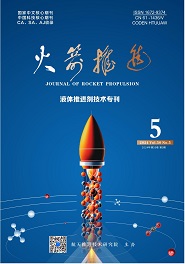航天推进技术研究院主办
HU Renzhong,LI Xiaoming,WANG Xin.Effect of inlet pressure on measurement of flow resistance coefficient of cavitating venturi[J].Journal of Rocket Propulsion,2019,45(02):20-25.
入口压力对汽蚀管流阻系数测量的影响
- Title:
- Effect of inlet pressure on measurement of flow resistance coefficient of cavitating venturi
- 文章编号:
- 1672-9374(2019)02-0020-06
- Keywords:
- liquid rocket engine; cavitating venturi; inlet pressure; flow resistance coefficient; correction method
- 分类号:
- V434.3
- 文献标志码:
- A
- 摘要:
- 汽蚀管流阻系数测量值是液体火箭发动机性能计算和调整的直接依据。针对液流试验中某些汽蚀管入口压力无法加压至额定值的问题,建立了流阻系数分析模型,研究了汽蚀管入口压力对流阻系数测量的影响,得出了流阻系数随入口压力变化的关系式及入口压力对流阻系数影响的修正公式,并对测量流阻系数的五级压力试验方法进行了评估。结果表明:入口压力增大,喉部等效流通面积减小,流阻系数增大; 流阻系数随入口压力倒数的减小近似线性增大; 额定入口压力两侧对称压力下的流阻系数偏差不同,压力减小引起的流阻系数偏差大于压力增大引起的偏差; 五级流量法测定的流阻系数偏小,选取五级入口压力应尽量靠近额定入口压力或不对称选取; 当试验入口压力均低于额定入口压力时,采用修正方法修正流阻系数测量值,可有效减小其偏差。
- Abstract:
- The measured flow resistance coefficient of cavitating venturi is the direct basis for the performance calculation and adjustment of liquid rocket engine.Aiming at the problem that the inlet pressure of some cavitating venturis could not be pressurized to the rated value in liquid flow test, the analysis model of flow resistance coefficient was established and the effect of inlet pressure of cavitating venturi on the measurement of flow resistance coefficient was studied. The relationship between the flow resistance coefficient and the inlet pressure was obtained as well as the related correction formula.In addition, the five-stage pressure test method for measuring flow resistance coefficient was evaluated.The research results show that with the increase of inlet pressure, the throat equivalent circulation area of cavitating venturi decreases and the flow resistance coefficient increases.The flow resistance coefficient increases approximately linearly with the decrease of reciprocal inlet pressure.The deviation of flow resistance coefficient is different under the symmetrical pressure on both sides of the rated inlet pressure, and the deviation of flow resistance coefficient caused by inlet pressure decrease is greater than the deviation caused by inlet pressure increase.The flow resistance coefficient measured by the five-stage flow method is small, so the inlet pressure of the five-stage inlet pressure should be selected as close as possible to the rated inlet pressure or asymmetrically.When all inlet pressures are all lower than the rated inlet pressure in liquid flow test, the deviation can be effectively reduced by correcting the measured value of flow resistance coefficient.
参考文献/References:
[1] SOLMAZ M B, YAZICI B, SUMER B. Numerical & experimental investigation of cavitating venturi geometry on LOX flows:AIAA 2014-3997[R]. Cleveland: AIAA, 2014.
[2] SALVADOR G P, FRANKEL S H. Numerical modeling of cavitation using Fluent validation and parametric studies:AIAA 2004-2642[R]. Portland: AIAA, 2004.
[3] 张小斌,曹潇丽,邱利民,等.液氧汽蚀管汽蚀特性计算流体力学研究[J].化工学报,2009,60(7):1638-1643.
[4] CHANGHAI X, HEISTER S D, COLLICOTT S H, et al. Modeling cavitating venturi flows:AIAA 2002-3699[R]. Indianapolis: AIAA, 2002.
[5] 曹东刚,何国强,潘宏亮,等.三种空穴模型在可调汽蚀文氏管数值模拟中的对比研究[J].西北工业大学学报,2013,31(4):596-601.
[6] 熊莉芳,林源,王鹏武,等.汽蚀管两相流数值仿真及内型面参数影响研究[J].火箭推进,2015,41(2):79-86.
XIONG Lifang,LIN Yuan,WANG Pengwu,et al.Numerical simulation of two-phase flow and study on effect of interior structure parameter of cavitation nozzle[J].Journal of Rocket Propulsion,2015,41(2):79-86.
[7] 唐虎,张金容,韩红伟.汽蚀管流场数值模拟[J].火箭推进,2013,39(4):52-55.
TANG Hu,ZHANG Jinrong,HAN Hongwei.Numerical simulation of venturi flow field[J].Journal of Rocket Propulsion,2013,39(4):52-55.
[8] 唐虎,毕勤成.文丘里管汽蚀实验研究[J].火箭推进,2015,41(5):54-60.
TANG Hu,BI Qincheng.Experimental study of cavitation in venturi[J].Journal of Rocket Propulsion,2015,41(5):54-60.
[9] 张伟.汽蚀模型及湍流修正对非稳态汽蚀影响机理[D].杭州:浙江大学,2014.
[10] 赵东方.液氮汽蚀管汽蚀动态特性可视化试验研究[D].杭州:浙江大学,2016.
相似文献/References:
[1]郑 伟,李护林,陈新红.激光快速成形技术在液体动力领域的应用前景[J].火箭推进,2015,41(06):1.
ZHENG Wei,LI Hulin,CHEN Xinhong.Application prospect of laser rapid prototyping
technology in the field of liquid power[J].Journal of Rocket Propulsion,2015,41(02):1.
[2]郭 敬,宋晶晶,孔凡超.发动机推进剂增压输送系统建模仿真技术综述[J].火箭推进,2015,41(05):1.
GUO Jing,SONG Jingjing,KONG Fanchao.Overview of modeling and simulation technology
for propellant pressurization feed system
of liquid rocket engine[J].Journal of Rocket Propulsion,2015,41(02):1.
[3]于 康,谢荣华,陈晓江.表面张力贮箱电子束焊接工艺研究[J].火箭推进,2015,41(05):89.
YU Kang,XIE Ronghua,CHEN Xiaojiang.Study on electron beam welding process
for surface tension tank[J].Journal of Rocket Propulsion,2015,41(02):89.
[4]刘中华,苏 晨,汪军安,等.气路膜片设计研究[J].火箭推进,2015,41(05):95.
LIU Zhonghua,SU Chen,WANG Junan,et al.Design and study of pneumatic diaphragm in gas circuit[J].Journal of Rocket Propulsion,2015,41(02):95.
[5]薛 薇,蔡震宇,曹红娟,等.基于可视化平台的液氢/液氧火箭发动机核心部件质量计算[J].火箭推进,2015,41(04):61.
XUE wei,CAI Zhenyu,CAO Hongjuan,et al.Mass calculation of key assembly units in
LH2/ LOX rocket engine based on visual interface[J].Journal of Rocket Propulsion,2015,41(02):61.
[6]穆朋刚,童 飞,蒲光荣,等.温度对贮箱增压系统的影响分析[J].火箭推进,2015,41(04):74.
MU Penggang,TONG Fei,PU Guangrong,et al.Influence of temperature on tank pressurization system[J].Journal of Rocket Propulsion,2015,41(02):74.
[7]高朝辉,刘 宇,肖 肖,等.垂直着陆重复使用运载火箭对动力技术的挑战[J].火箭推进,2015,41(03):1.
GAO Zhao-hui,LIU Yu,et al.Challenge to propulsion technology for vertical
landing reusable launch vehicle[J].Journal of Rocket Propulsion,2015,41(02):1.
[8]申智帅,等.气动增压器技术及其在空间推进系统的应用[J].火箭推进,2015,41(03):15.
SHEN Zhi-shuai,RUAN Hai-jun,et al.Pneumopump technology and its application
in space propulsion system[J].Journal of Rocket Propulsion,2015,41(02):15.
[9]张 翔,徐洪平,安雪岩,等.液体火箭发动机稳态运行故障
数据聚类分析研究0[J].火箭推进,2015,41(02):118.
ZHANG Xiang,XU Hong-ping,AN Xue-yan,et al.Clustering analysis for fault data in steady process of
liquid propellant rocket engine[J].Journal of Rocket Propulsion,2015,41(02):118.
[10]窦 唯,闫宇龙,金志磊,等.某发动机涡轮泵转子高温超速/疲劳试验研究[J].火箭推进,2015,41(01):15.
DOU Wei,YAN Yu-long,JIN Zhi-lei,et al.Fatigue experiment of turbo-pump rotor at
over-speed and high temperature condition[J].Journal of Rocket Propulsion,2015,41(02):15.
备注/Memo
收稿日期:2018-04-22; 修回日期:2018-11-01 基金项目:装备预研联合基金(61401B06240601) 作者简介:胡仁众(1994—),男,硕士,研究领域为液体火箭发动机
